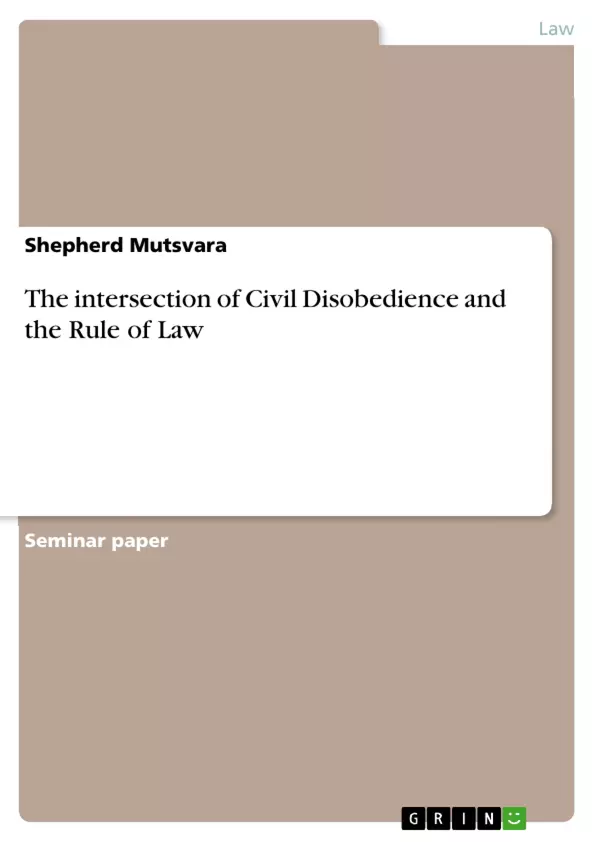The principal objective of this paper is to critically analyse how the post-1994 South African government has reacted to civil disobedience, when it is the very tool that has played a large role in bringing them to power. The new rainbow nation has had unarmed confrontation with the State in areas of racial harmonisation, socio-economic issues and unreasonable governmental policies. While acknowledging that civil disobedience is at cross purpose with the law, the paper establishes that civil disobedience and the rule of law should be balanced in a healthy democracy.
The citizenry should be made aware of its rights and obligations imposed by the constitution. On the other hand, the State’s response to civil disobedience should be one enveloped in legal authority. Thus civil disobedience in any democracy should not be met with a knee jerk reaction. The paper also scrutinizes the divergent views on law and morality. Divergent as they are, the common denominator is that no society can do without intoleration, indignation and disgust which in the end may lead to civil disobedience. This study will define the concept civil disobedience and rule of law. The link between civil disobedience and the rule of law shall be explained through theories of legal positivism and natural law in particular the Hart-Devlin debate and the Hart-Fuller debate.
Inhaltsverzeichnis (Table of Contents)
- THE PROBLEM STATEMENT
- Introduction
- WHAT IS CIVIL DISOBEDIENCE?
- LEGAL POSITIVISM AND NATURAL LAW
- The Hart-Devlin Debate
- Hart-Fuller Debate
- APPLICATION: THE SOUTH AFRICAN DEBATE
- Pre-1994
- Post-1994
- CONCLUSION
Zielsetzung und Themenschwerpunkte (Objectives and Key Themes)
This paper aims to investigate the complex relationship between civil disobedience and the rule of law, specifically within the South African context. The study delves into the historical and contemporary dynamics of civil disobedience, examining its motivations, forms, and consequences. It seeks to establish a balance between the right of citizens to engage in acts of protest and the need for a functioning legal system.
- The definition and forms of civil disobedience
- The role of legal positivism and natural law in understanding civil disobedience
- The intersection of civil disobedience and the rule of law in South Africa, both during apartheid and after 1994
- The potential for civil disobedience to undermine or strengthen a democracy
- The implications of civil disobedience for the judiciary and the legislative process
Zusammenfassung der Kapitel (Chapter Summaries)
- The Problem Statement: This chapter introduces the concept of civil disobedience, its connection to political protest, and its potential for conflict with the rule of law. It highlights the importance of understanding the complexities of this relationship, particularly in a country with a history of legal and political struggle like South Africa.
- What is Civil Disobedience? This chapter provides a comprehensive definition of civil disobedience, outlining its core principles and forms. It explores the historical and philosophical roots of this concept, referencing the ideas of Mahatma Gandhi and other prominent figures.
- Legal Positivism and Natural Law: This chapter delves into the contrasting theories of legal positivism and natural law, examining how these perspectives influence the understanding of civil disobedience. It focuses on the Hart-Devlin debate and the Hart-Fuller debate, highlighting their key arguments and implications.
- Application: The South African Debate: This chapter analyzes the intersection of civil disobedience and the rule of law in South Africa, exploring both the pre-1994 and post-1994 periods. It examines how these periods have shaped the relationship between citizens and the legal system, demonstrating the complexities of navigating civil disobedience within a changing political landscape.
Schlüsselwörter (Keywords)
Key words and concepts explored in this paper include civil disobedience, rule of law, legal positivism, natural law, Hart-Devlin debate, Hart-Fuller debate, South African law, apartheid, democracy, constitutionalism, judicial review, and protest.
Frequently Asked Questions
What is the definition of civil disobedience?
Civil disobedience is the active, professed refusal of a citizen to obey certain laws, demands, orders, or commands of a government, usually as a form of non-violent political protest.
How does the rule of law intersect with civil disobedience in South Africa?
In South Africa, civil disobedience was a key tool against apartheid. Post-1994, the challenge is balancing the right to protest with the constitutional duty to uphold the legal system.
What are the Hart-Devlin and Hart-Fuller debates?
These are famous legal-philosophical debates regarding the relationship between law and morality, and whether unjust laws should still be considered legally binding.
What is the difference between legal positivism and natural law?
Legal positivism views law as a set of rules created by human authority, while natural law suggests that laws must be grounded in universal moral principles.
Can civil disobedience strengthen a democracy?
Yes, when balanced properly, it can act as a catalyst for social change and highlight government policies that are perceived as unjust or unconstitutional.
- Arbeit zitieren
- Shepherd Mutsvara (Autor:in), 2013, The intersection of Civil Disobedience and the Rule of Law, München, GRIN Verlag, https://www.grin.com/document/369229



